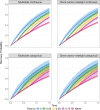Causal Multistate Models to Evaluate Treatment Delay
- PMID: 40200098
- PMCID: PMC11978571
- DOI: 10.1002/sim.70061
Causal Multistate Models to Evaluate Treatment Delay
Abstract
Multistate models allow for the study of scenarios where individuals experience different events over time. While effective for descriptive and predictive purposes, multistate models are not typically used for causal inference. We propose an estimator that combines a multistate model with g-computation to estimate the causal effect of treatment delay strategies. In particular, we estimate the impact of strategies such as awaiting natural recovery for 3 months, on the marginal probability of recovery. We use an illness-death model, where illness and death represent, respectively, treatment and recovery. We formulate the causal assumptions needed for identification and the modeling assumptions needed to estimate the quantities of interest. In a simulation study, we present scenarios where the proposed method can make more efficient use of data compared to an alternative approach using cloning-censoring-reweighting. We then showcase the proposed methodology on real data by estimating the effect of treatment delay on a cohort of 1896 couples with unexplained subfertility who seek intrauterine insemination.
Keywords: causal inference; g‐computation; multistate model; observational data; survival analysis.
© 2025 The Author(s). Statistics in Medicine published by John Wiley & Sons Ltd.
Conflict of interest statement
The authors declare no conflicts of interest.
Figures



References
-
- Putter H., Fiocco M., and Geskus R. B., “Tutorial in Biostatistics: Competing Risks and Multi‐State Models,” Statistics in Medicine 26, no. 11 (2007): 2389–2430. - PubMed
-
- Prentice R. L., Kalbfleisch J. D., Peterson A. V., Flournoy N., Farewell V. T., and Breslow N. E., “The Analysis of Failure Times in the Presence of Competing Risks,” Biometrics 34, no. 4 (1978): 541. - PubMed
MeSH terms
LinkOut - more resources
Full Text Sources
